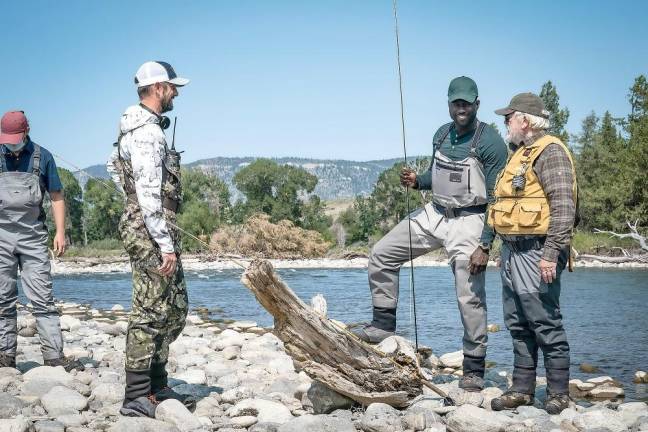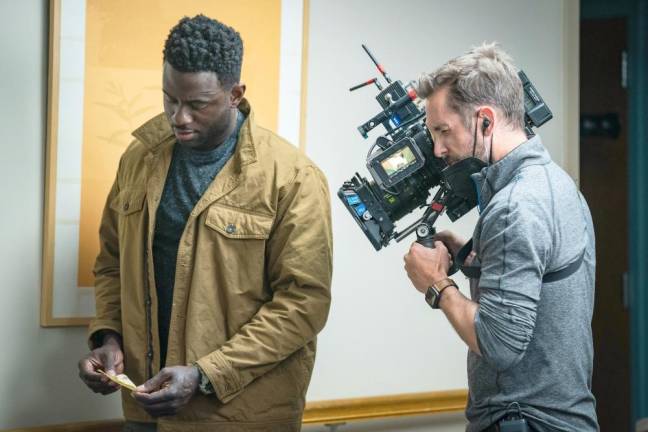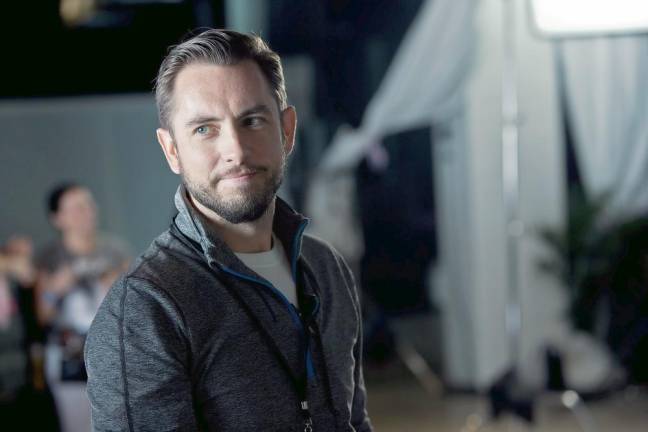Warwick filmmaker probes veteran shift to civilian life via flyfishing in new movie
Warwick. “Mending the Line,” a new film by filmmaker Josh Caldwell, of Warwick, was recently shown on opening night of Woodstock Film Festival. Caldwell has made other short and full length films that have attracted interest and interesting reviews.



Filmmaker Josh Caldwell, of Warwick, recently sat down for a chat about his new film, “Mending the Line,” which was the opening night feature at Woodstock Film Festival in October and will be in wider distribution in 2023. The story explores the difficulties veterans face readjusting to civilian life and the role fly-fishing can have in that process.
Caldwell grew up in Seattle, attended Fordham University in New York, and then moved to Los Angeles to focus on filmmaking.
After a childhood full of filmgoing with his father, he delved into filmmaking in high school, first making a film about a suicidal teen that drew local attention and then a Star Wars spoof shown at his high school. He has since shot numerous short and feature length films. He has his own production company, Meydenbauer Entertainment.
Mending the Line looks through the eyes of a soldier who suffers from PTSD.
“I prefer a subjective narrative to an objective one and learn all I can through research and real accounts to allow the audience to step into a character’s shoes,” Caldwell said.
What brought you to Warwick?
Settling down in Warwick took several steps: 1) attend Fordham University in New York City 2) meet my future wife Danielle in a film studies class 3) get married a year after graduating 4) move to Los Angeles for ten years, where I developed my career as a filmmaker 5) decide it was time to move out of LA to somewhere different and closer to family. Our real estate agent recommended checking out Warwick. We did, found a beautiful home, and pulled the trigger. We love it here. We love the community, the small town vibe, and the proximity to both NYC and the greater wilderness of New York State.
What is your background as a filmmaker—how did you get into it, and what else have you done with it?
I’ve been making movies since I was in high school, but it took me a long time before I could really call myself a filmmaker. I directed my first feature, “Layover,” in 2013. It’s an independent, French-language film made for about $6000, but something about that movie just really stuck with people. We had our World Premiere to sold-out crowds at the 2014 Seattle International Film Festival where it was nominated for the prestigious Fipresci New American Cinema Award. I also wrote and directed “Infamous,” starring Bella Thorne, which was released in 2020. We were the #1 New Movie in America the week of its debut. Indiewire called the film “nihilistic and uncomfortably believable” with “an appropriately nutso performance from Bella Thorne.” Variety called it “perversely fascinating” and “infused with kinetic verve.” It was a lot of fun to make. My other films include “Be Somebody,” for Paramount Pictures, “Negative,” for MarVista Entertainment, as well as the Hulu Series, “South Beach.”
In addition to my feature work as director, I also direct commercials and brand videos through my company Authentik Pictures. I’ve worked with numerous companies and brands in the commercial space including ABC Television, Discovery Channel, Animalist, Symantec/Norton Anti-Virus, Yahoo, Samsung, Nissan, BOD Man, Fiat, Toyota, Duracell, SonyBMG, Universal Music Group, MySpace Records, Epic Records, mtvU, Dutton Publishing, the Bubba Gump Shrimp Co., Nordstrom, and others.
What prompted you to make Mending the Line?
When it was first pitched to me, I knew I had to do it. First of all, I’m a fly fisherman, so to make a movie about something that’s grown to be a passion of mine was the first draw. But once I read Stephen Camelio’s script, I knew there was so much more to the story than just fly fishing. For me, there are few things that match the feeling of catching a fish on the fly – the bolt of electricity shooting through the line as it goes tight, the dance as you slowly guide it into your net, the pure muscle of the trout as you hold it in your hand. It takes you outside of yourself, requires your focus to do it properly and gets you outside amidst nature. The therapeutic power of fly fishing for those suffering from trauma, especially veterans, can be attested to by the number of organizations supporting it, including Warriors & Quiet Waters, as well as the number of veterans to be found throwing a line on local trout streams.
I’ve been exploring the military and the effects of PTSD for a number of years now in various projects but this is the first to bring everything together into a story that I believe can have real impact. Sebastian Junger writes in ‘Tribe’: “Today’s veterans often come home to find that, although they’re willing to die for their country, they’re not sure how to live for it.” Colter and Ike (and even Lucy) are all trying to figure out how to live. Telling this story is incredibly important because I’ve seen the difference something like fishing can make in lives of those who are suffering. This film isn’t based on a true story; it’s based on many true stories.
What was it like making the film? Pivotal moments? Poignant moments?
Making the film felt epic at times. I’m standing on a cliff overlooking the Yellowstone River in Paradise Valley, Montana, surrounded by the Absaroka Mountain range, doing something I love. What could be better?
The chance to work with legendary talents like Brian Cox, Wes Studi, and Patricia Heaton was such a treat, I learned so much from the experience. And then you’ve got Sinqua Walls and Perry Mattfeld bringing their A-game every day on set. It was so much fun to watch these actors perform. There was such a level of vulnerability due to the nature of the story and I felt honored to be trusted by those actors. They really delivered, and I think it shows in the film.
Beyond our time in Montana, we shot the opening of the film at Camp Pendleton just outside San Diego. We were fortunate to partner with the U.S. Marine Corps Entertainment Liaison Office and they really came through with their support. In addition to allowing us to shoot on the base, they provided Marines, vehicles, gear and technical advisors to make sure we got things right.
And that was always my goal making this film: I wanted to make sure we got things right. Be it the fly fishing, the effects of PTSD, or our representation of Marines before and after service, it was so important that we were as authentic as possible.
For me, there are few things that match the feeling of catching a fish on the fly – the bolt of electricity shooting through the line as it goes tight, the dance as you slowly guide it into your net. - Josh Caldwell
I’ve seen the difference something like fishing can make in lives of those who are suffering. This film isn’t based on a true story; it’s based on many true stories. - Josh Caldwell